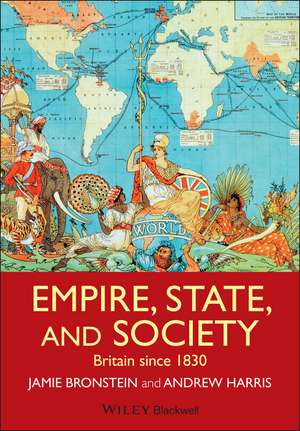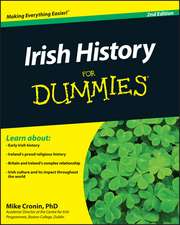Empire, State, and Society – Britain since 1830
Autor J Bronsteinen Limba Engleză Paperback – 8 feb 2012
- Offers a crucial comparative dimension which sets the experience of Britain alongside that of twenty–first–century superpower, the United States of America
- Draws on recent scholarship to provide a highly current perspective
- Organised to allow professors to assign readings with more or less depth as student abilities and course lengths allow
- Written in a style that is wholly accessible and exciting for undergraduates in both the US and the UK
Preț: 463.31 lei
Nou
88.65€ • 92.56$ • 73.37£
Carte tipărită la comandă
Livrare economică 04-18 aprilie
Specificații
ISBN-10: 140518180X
Pagini: 352
Ilustrații: illustrations
Dimensiuni: 172 x 247 x 16 mm
Greutate: 0.54 kg
Ediția:New.
Editura: Wiley
Locul publicării:Chichester, United Kingdom
Public țintă
Introductory–level courses in British history that spans the time period; also appropriate as background reading for courses on Victorian Britain, and nineteenth and twentieth century BritainDescriere
In the nineteenth century, Great Britain was a world–recognized superpower. Tremendous economic growth fostered a daunting formal empire, global networks of trade and investment, and a formidable military. By the late twentieth century this position of dominance had eroded significantly under the stress of two world wars, rising nationalist movements, shifting geopolitics, and the transformation to a post–industrial economy. As Britain adjusts to her new place in the post–colonial world, Empire, State, and Society assesses the external and internal forces behind these transformations.
The authors draw on the most recent scholarship to give due importance to social, economic, and cultural changes as well as politics and international diplomacy. Divided into chapters both chronologically and thematically, Empire, State, and Society enables detailed exploration of issues such as race, gender, religion, and the environment. In doing so, the book provides an accessible, comprehensive, and balanced introduction to British history.
Textul de pe ultima copertă
In the nineteenth century, Great Britain was a world–recognized superpower. Tremendous economic growth fostered a daunting formal empire, global networks of trade and investment, and a formidable military. By the late twentieth century this position of dominance had eroded significantly under the stress of two world wars, rising nationalist movements, shifting geopolitics, and the transformation to a post–industrial economy. As Britain adjusts to her new place in the post–colonial world, Empire, State, and Society assesses the external and internal forces behind these transformations.
The authors draw on the most recent scholarship to give due importance to social, economic, and cultural changes as well as politics and international diplomacy. Divided into chapters both chronologically and thematically, Empire, State, and Society enables detailed exploration of issues such as race, gender, religion, and the environment. In doing so, the book provides an accessible, comprehensive, and balanced introduction to British history.
Cuprins
Recenzii
Notă biografică
Jamie L. Bronstein is Professor of History at New Mexico State University. She is the author of three books: Land Reform and Working–Class Experience in Britain and the United States, 1800–1862 (1999), Caught in the Machinery: Workplace Accidents and Injured Workers in Nineteenth–Century Britain (2008), and Transatlantic Radical: John Francis Bray (2009).
Andrew T. Harris is Associate Provost for Faculty Affairs at Bridgewater State University. He is the author of Policing the City: Crime and Legal Authority in London, 1780–1840 (2004).











